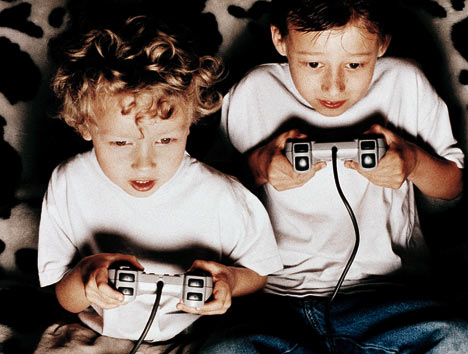Self-Control
Your child may have difficulty running, jumping or throwing
Why you should be concerned if your child has poor motor skills
Posted May 12, 2010
I continue to be drawn to write about topics related to the importance of body sense and paying attention to the needs of the body for children in educational settings. Among other things, I've suggested letting children move and fidget during classroom activities, having more free and outdoor play, having contact with animals and their movements, using exercise balls instead of chairs, scheduling recess before lunch instead of after lunch, leaving time for more contemplative activity such as brief guided meditation and yoga, and using peaceful touch (a curriculum for educating children in tactile communication and relaxation).
But there are new research findings that build on these ideas, like one showing that more than eight out of every ten disadvantaged preschoolers from two urban areas showed significant developmental delays in basic motor skills such as running, jumping, throwing and catching. According to Jacqueline Goodway, lead author of the study, "Most people, even many educators, believe that motor skills just naturally develop in children, but our study shows that's clearly not true . . . Like any skill, there needs to be instruction, there needs to be practice, there needs to be feedback. That's how children master these motor skills . . . These children spend most of their time sitting in school and then going home and sitting in front of the TV."
A colleague of mine who takes her pre-school child to a dance movement class told me that the teacher said that school-age children these days have difficulty handling balls, throwing and catching. This teacher speculated that so many children are limiting themselves to the types of eye-hand coordination involved in computer games that they don't learn ball skills that require far-away sight and large-motor coordination.

Most of the educational recommendations arising from this type of observation is that motor skills are important in themselves, which is certainly true. But it goes way beyond that. The book, "Why Motor Skills Matter" is a good introduction to practice tools and why they are important. Body sense is intimately related to all aspects of success in school because it helps in the development of self-regulation, important for concentration and thinking. Preschool and elementary school children who are better at touching their head and toes in response to verbal commands have higher scores on tests of behavioral inhibition, self-control, attention, and remembering in the classroom.
There is also new research on the effects of classroom environments on children's self-regulatory function. Dr. Mariana Figueiro and Dr. Mark Rea of the Rensselaer Polytechnic Institute's Lighting Research Center, currently in press at Neuroendocrinology Letters, randomly assigned some children to wear glasses that block out short wave-length sunlight, the kind that occurs in the morning hours compared to a control group without the glasses. The teens without the glasses and who were exposed to more natural light in the morning got on average 30 minutes more sleep at night. The results have implications for school building design and construction, which, incidentally, align with new "green" building guidelines for bringing in more natural light, especially south-facing exposures.
I have a personal investment in building body sense education into school curricula and design. I grew up in a lower-income neighborhood in Miami, Florida. When I started in the first grade of elementary school in 1951, I was immediately labeled as a problem child. I hated being confined to sitting in the school desks with their immobile seats. I fidgeted and made noises. I admittedly had poor self-regulation skills but the school's response was punishment: detention and extra work. I only found out in the 3rd grade that I had severe myopia, which likely made me focus on the near environment rather than what the teacher did in the front of the classroom. Fortunately, and unlike most low-income neighborhoods these days, the streets were safe enough for kids to walk or ride their bikes to school. After school, we played baseball or football on the street, rode our bikes around the neighborhood, and walked and ran.
Schools have improved in some ways in the last 60 years. There is now more identification of and programming for children with special needs. But few schools know how to work with non-diagnosed children, like myself, with shaky self-regulatory skills which are fundamentally about dysfunctional body sense. I was a bed wetter. I had troubling dressing and washing myself even though I excelled at street sports. I had difficulty expressing my emotions. Would a school system today know how to assist children like me and their families?
There is much new research showing that my experience is not so unusual, that executive function and self-regulation, like motor skills, have to be taught to children and thus should be a fundamental part of every school curriculum, from pre-school through high school. The body challenges that teens face (puberty, adult desires in a child body, and risk-taking) are different from those of a child in the early years of schooling (paying attention, basic motor skills, and psychomotor skills like reading and writing), and all children -everyone at any age in fact - is coping on a daily basis with the regulation of eating, sleeping, digestion, social identity and physical appearance, and any condition in which the body does not fit the culturally expected ideals of shape, size, acuity, and agility.
We've operated for centuries under the assumption that the body's "lower" needs and urges must be suppressed in order to develop our "higher" human faculties of thought, moral behavior, and spiritual attainment. It is time to wash our collective hands of this cruel dichotomy that has left the poor self-regulators and those with disabilities prey to feelings of shame and worthlessness, not to mention lost opportunities to achieve their fullest potential. The optimal function of the mind requires the body in which it takes up permanent residence to be alive, happy, mobile, and free of pain and stress. Everyone needs guidance in the care and feeding of our most precious asset.


